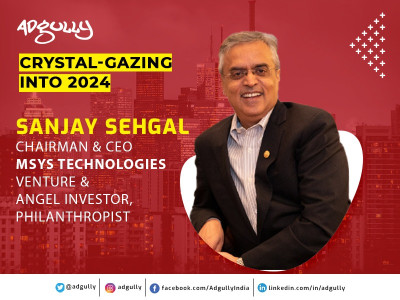“Digital innovation is at the cusp of becoming obsolete or redefining its usefulnessâ€
In this interview with Adgully, Sanjay Sehgal, Chairman & CEO, MSys Technologies, a global technology services company that specializes in storage, cloud computing, big data analytics, and DevOps, shares his insights on the current tech landscape, the emergence of Chat GPT, the future of digital publishing, and the Indian tech industry's role in a global economy. Additionally, Sehgal, who is also a venture and angel investor and a philanthropist, explores the role of upskilling in ensuring job security in the face of technological advancements and the unique position of the Indian tech industry in the global economy.
“With every tech revolution, there are job losses; a few years back we embraced the same scenario with the era of test automation, which eliminated the need to have manual testing. But this does not have to be the case as with each technological advancement if you upskill your workforce there is a symbiotic relationship that leads to larger efficiencies,” he says. Excerpts from the interview:
What does the emergence of Chat GPT mean for the industry, advertisers, and tech professionals?
It’s no news that ChatGPT has taken the world by storm, and this global tech phenomena hints at a new innovation that has been in the works for many years with several tech companies. This new wave will be led by tools empowered with AI and machine learning that will automate tasks in the publishing, digital advertising and customer service industry. For example, it will help advertisers not only target the right audience but also draft personalized messaging for the said audience. The service industry can benefit from the natural language processing of AI tools like Bard and ChatGPT that can act as intuitive chat bots to improve service quality with minimal human intervention. For tech professionals, it is nothing but great news as the industry will need a new league of workforce to build more such tools, just like they did when we saw the uprising of apps.
Exciting times lay ahead and it is imperative that industry professionals and organisations at large understand about this technology and upskill themselves to work with it.
What is the future of digital publishing? How will Metaverse and AI change their face?
Digital innovation is at the cusp of either becoming obsolete or redefining its usefulness. Advent of not just ChatGPT, but also several bleeding edge tech empowered by AI and machine learning will automate several tasks of digital publishing. However, we will always rely on humans to deliver the end results; AI may be able to create a foundation for them to creatively mold into a finished product of content.
As the tech industries across the world see a sizable decline, what will it take for young entrepreneurs and new workforce entrants in the tech industry to survive and thrive in this period?
ChatGPT has emerged at a very crucial time in the tech industry, where there is a major upheaval in the market, and an innovation to push tech was much needed. It will serve as a boon to the industry where AI is bound to automate several repetitive tasks and bound to improve the quality of several tasks.
With every tech revolution, there are job losses; a few years back we embraced the same scenario with the era of test automation which eliminated the need to have manual testing. But this does not have to be the case as with each technological advancement if you upskill your workforce there is a symbiotic relationship that leads to larger efficiencies.
How do you distinguish between the tech industry in India vs the world? Why does the Indian tech industry not go through a tectonic shift and massive layoffs as we have seen elsewhere?
The Indian tech industry is synonymous with the IT and BPO industry, which are some of the biggest services we export globally. Tech companies throughout the world may witness a major setback, but our offerings at attractive and competitive pricing make us an important, albeit somewhat indispensable, part of the digital fabric of global world’s largest tech players. In the next few years, India could also be one of the major players in the AI industry, which will further expand our capabilities to robotics and strengthen our tech leadership in a global economy. Additionally, we see a new opportunity not just to aid businesses with our services, but also develop them with digital engineering, product development, and other core business aspects.
In the current landscape, global tech players are now turning away from China owing to their mercurial management done during COVID which has proven beneficial for us as those companies are turning towards India as one of the tech destinations.
What are the product engineering use cases for the content creator industry?
Just as you develop a software product through product engineering, you can also enhance, pivot, innovate, and make an efficient use of all the available resources in your content creation journey through this. For example, content creators need video editing software that is easy to use, feature-rich, and can process large video files quickly. Product engineering can help develop and improve video editing software to meet the needs of content creators. It can also help with digital asset management where a system can organise and manage their assets in a personalized fashion.
How does a complex tech infrastructure tool like a product engineering application pave the way for reshaping how content creators approach and use Metaverse?
Product engineering plays a critical role in the content creator industry by developing software and tools that enable creators to produce high-quality content efficiently and effectively. It can help them develop new and innovative AR and VR experiences that can engage and captivate their audience.







Share
Facebook
YouTube
Tweet
Twitter
LinkedIn